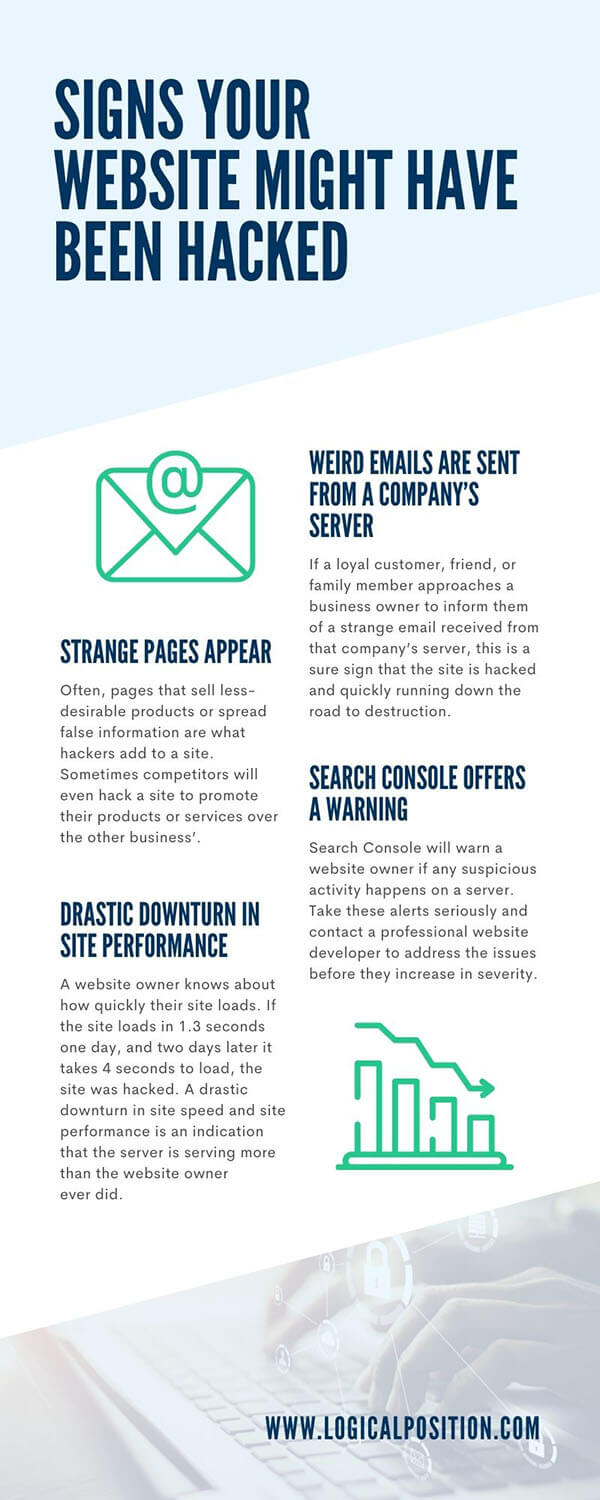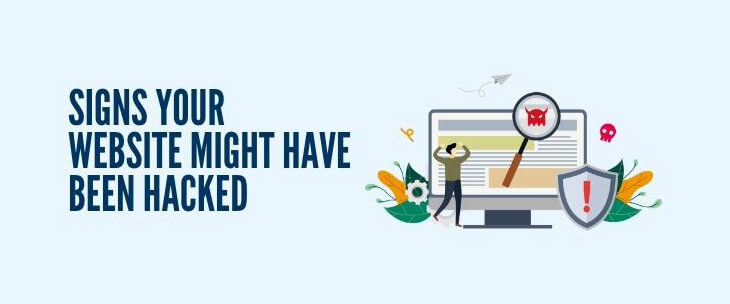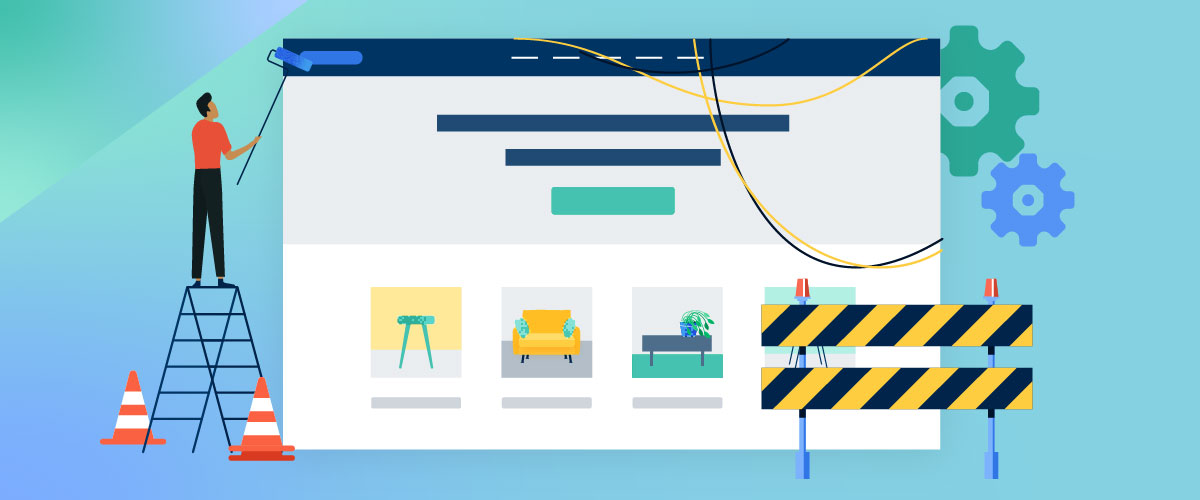A website is one of the most critical assets of a company and one of the key elements in web design is site security. With the current emphasis on the online accessibility of goods and services for consumers, being in complete control of your business site is vital. Hacking isn’t what it used to be. When most people think of website hacks, ransomware comes to mind. Ransomware was when big messages popped up, proclaiming the site hacked and demanding money in exchange for control. Big, bold proclamations aren’t how hacking works anymore. A hacker’s goal is to remain unnoticed for as long as possible, feeding off a site’s rankings and audience until it’s flagged by key search engines and potentially banned. All business and website owners should know the signs your website might have been hacked.
Hacking: What it Means for a Website
The word “hacking” covers a wide range of issues. Hackers have a variety of goals when attacking a website. There are countless hacking methods. The industry of website hacking is a lucrative one—some hackers even develop and sell their hacking codes. It is a booming business that capitalizes on stealing from other sites’ hard-earned statuses.
When a website becomes hacked, it is a severe issue that needs handling swiftly. The results of neglecting a successful hacking attempt can be devastating to a business and its customers. There is more than one-way websites experience hacking.
Strange Pages Appearing on the Site
Business website owners need to know all of the pages that live on their site. This helps to identify when other pages pop up that weren’t made or sanctioned by the business owner. Often, hackers get into a site and, instead of taking control of it like used to be the norm, they add their own pages. The added pages are often strange and detrimental to the business.
The Dangers of Strange Pages
Strange pages can force a website to start ranking for undesirable keywords or keywords that have nothing to do with the intended business or audience. A professional website developer must address this issue as a simple redirect of the suspicious URLs will not fix the problem.
Pro Tip: When a site gets hacked, a business website owner must treat the disease, not just the symptoms. Strange pages appearing is merely a symptom of a much larger problem. Redirecting those pages affected does not prevent more pages from appearing. Contact a professional immediately after noticing strange pages.
Sever Stealing
When a website becomes hacked, the hacker will often draw on the pages already established, which can drastically affect the site speed and load times of a site. This is to serve things off of the server of a business website. It causes a drastic downturn in the performance of a site. This is an issue. It is increasingly important to maintain a passing grade on Web Core Vitals with search engines such as Google to continue ranking in results.
The Dangers of Server Stealing
A website’s site speed can see severe downturns rapidly. This can lead to search engines flagging the site or even giving it a “does not pass” by the Web Core Vitals. A “does not pass” rating indicates that the site is not up to par with the requirements to rank on Google and like search engines. This can quickly dismantle a business as new customers cannot easily find the website anymore.
Email List Abduction
Companies work tirelessly on establishing a well-vetted and beneficial email list of customers. Email marketing is one of the most effective ways to build impressions, conversions, and customer loyalty. Hackers will come in and steal the email list; flooding valued customers’ inboxes with spam and unrelated messaging.
The Dangers of Email List Abduction
When a business’s email list gets stolen, emails are sent out as the business by hackers, and the site is blacklisted. There are about 40 different blacklists the email can be placed on, making it a long and tiresome road to be reinstated. Emails business owners send to their customers after being blacklisted don’t even make it to their email list recipients’ spam folder.
Content Spamming
Content spam is a less severe hack, meaning the damage to the website isn’t as lasting. Content spam is when hackers take advantage of what is allowed to happen within a website, such as a blog allowing spammy comments. This can deter those who may want to read a blog or interact with a business’ content from doing so.
The Dangers of Content Spamming
It takes much reform on a site to end the content spamming. Every moment content spamming continues, trust between a business and its customer base depletes. It can also have adverse effects on SEO as many sites won’t want to backlink to a blog, no matter how informational and quality, if full of spammy comments.
How Websites Get Hacked
There are multiple hacking methods into a website, depending on the hacker or hackers’ goal. The primary way websites become hacked is called an SQL injection. Here are the basic steps for an SQL injection.
- A hacker embeds its code in a JPG through an encoding process.
- The hacker then uploads it to a website with a space to upload photos or files, such as a “contact us” form or “review” column.
- The file starts running automatically when it gets to the database.
- Once the file is there, it replicates itself to create an additional hole, or “backdoor,” if the website developer finds and closes the first hole. This is so the hacker can get back into the site regardless if the first hole is fixed.
- Hackers inject hacking code into the database of the website. That database holds credentials for access to all areas on that server.
Once the code makes it to the database, the hackers will hold control of the site and slowly ruin the customer base and website rankings. Hackers are always bombarding sites attempting to reach their databases. A lot of hacking interfaces are highly complex and elaborate.
Pro Tip: Don’t fall into the trap of thinking small businesses aren’t targets. Hackers attack hundreds of sites per day. Every website, no matter how small, is always under attack.
How to Tell if Your Site is Hacked
There are a few telltale signs that a website became compromised by hacking code. Every hacker uses slightly different methods to accomplish their unique goals. Often, a site will be under attack for days without a website owner noticing—this is the goal of hackers. They want to stay hidden as long as possible so they can use all the resources a site has to offer and slowly drive it into the ground before moving on to the next site.
Site hacking is a similar process to a parasitic attack. Parasites attack hosts and slowly drain them, taking over their resources. Website owners should think of their websites as being constantly under attack—because they are. Always be on the lookout for these pieces of evidence of a hacking attack.
Strange Pages Appear
When strange pages appear that the website owner didn’t make, it’s a telltale sign that the site is compromised. Often, pages that sell less-desirable products or spread false information are what hackers add to a site. Sometimes competitors will even hack a site to promote their products or services over the other business’.
Weird Emails are Sent from a Company’s Server
If a loyal customer, friend, or family member approaches a business owner to inform them of a strange email received from that company’s server, this is a sure sign that the site is hacked and quickly running down the road to destruction. The first strange email identified should signify immediate and drastic action on the business owner’s part to save the server.
Search Console Offers a Warning
Search Console will warn a website owner if any suspicious activity happens on a server. Take these alerts seriously and contact a professional website developer to address the issues before they increase in severity. Hacking can ruin a business to the point of no recovery if not acted on quickly and fiercely.
Drastic Downturn in Site Performance
A website owner knows about how quickly their site loads. If the site loads in 1.3 seconds one day, and two days later it takes 4 seconds to load, the site was hacked. A drastic downturn in site speed and site performance is an indication that the server is serving more than the website owner ever did. This means a hacker uses it to serve their data and draw on the site speeds to do so.

Prevention Methods
It’s much more effective to work hard to prevent hacking than it is trying to fix a hacking after the fact. The best hacking prevention method is a business website owner who knows it’s not a question of “if” the site will face hacking attempts, but “when” it will. There are a few prevention methods every business website owner should take to protect their site.
Update the Site Regularly
Frequent updates to a website deter hackers. It also helps to keep a watchful eye on the site. A site that is continuously updated will also make discrepancies easier to spot. This also ensures any issues become spotted quicker. Regularly updated sites are more difficult for hackers’ code to reach and can help add a layer of protection to your site’s server.
Hire a Security Firm
One of the best things a business can do to protect their website from successful hacking attempts is to hire an online security firm. A security firm will watch the security of your site. Think of this as having your own army in the war for your server. Just as a website host, hire a security firm you trust. Gather recommendations from trusted business partners and website development professionals before settling on a security firm.
Avoid Commoditized Hosting
Website hosting is not the same across platforms. Commoditized hosting, typically the cheapest option, is never what it seems. In general, avoid any website hosting that promises unlimited domains, bandwidth, and more for less than $15 a month. This low-cost, over-promising type of host operates off of a shared environment.
Commoditized hosting works by gathering a wide net of customers. They then massively oversell smaller baseline sites while neglecting larger ones as they all pull from the same pool of resources. This opens up a website to security threats, hackers, and more. Most of these hosts will not do anything in the way of security, and with shared servers, this can create a plethora of sites for hackers to take over.
Ask the advice of a website development specialist, PPC specialist, or someone else trustworthy with hosting knowledge. When in doubt, remember that you get what you pay for and if a hosting deal sounds too good to be true, it is.
What to do if Your Site is Hacked
If a business owner believes their website was hacked, they need to take immediate action to save their website and company. Hacking is especially devastating to e-commerce businesses. When a business owner suspects hacking, these three steps should be taken first:
- Do a site colon (site:) on the website. It will show what Google has indexed on a site. Many hacks come in and place temporary phishing pages on the site, then leave. The site: will reveal if this happened to a website.
- Check and keep an eye on Search Console. Search Console will warn the site owner of any irregularities.
- Watch for both hacks of the site itself, the CMS, and server-side vulnerabilities.
Suppose any of these items come up abnormal. In that case, the first thing a company should do is contact a professional website developer. Once the hacking is confirmed by a professional, business owners should prepare for an adverse outcome. It is a distinct possibility that there will be news about the website and the costs to repair or regain control of it.
Advice for E-commerce Sites
Hacking is especially detrimental to e-commerce websites. After hacking is suspected, an e-commerce site must disable their cart to prevent customers from making further purchases. Once the hacking is confirmed, customers need to be notified about the hacking as their credit card information may now be at risk.
E-commerce websites that know about hacking and don’t disable carts and notify customers are typically extremely liable for damages, so it’s best to be extremely proactive.
When hacked, e-commerce orders are out of sync, so every order that happened from the time the site was hacked until the owner notices and took down the cart is considered vulnerable. These orders need to be manually reconciled with the older site, which is time-consuming and tricky.
Advice for Informational Sites
For non-e-commerce sites, some information and pages may be lost forever. This typically affects blogs. Some blog posts may be lost forever and need to be replaced. Hacking is still severe for non-e-commerce sites and should be taken seriously, especially if the email list is abducted.
Pro Tip: A hacked website is NOT repaired until a professional web developer gives the “all clear.”
All websites are vulnerable in some way to a successful hacking attempt. Prevention methods help to protect the site from some hacks, but hackers are continuously evolving. Some hackers even find a fun challenge in attacking well-protected sites. Websites are attacked because they are websites, not because of their profile or prominence. All business owners, especially e-commerce business owners, need to invest in the protection and security of their site.
At Logical Position, we offer a unique service called Review and Repair Diagnostic. Our team of professional web developers will review a site and fix the hacking attempts. Our team is dedicated to fixing the hacking problem and preventing any further attacks in the future. Contact us today for website development advice and services or if you’re concerned about a hacking attempt on your site. Our team specializes in small business website development, website repair, and much more.




